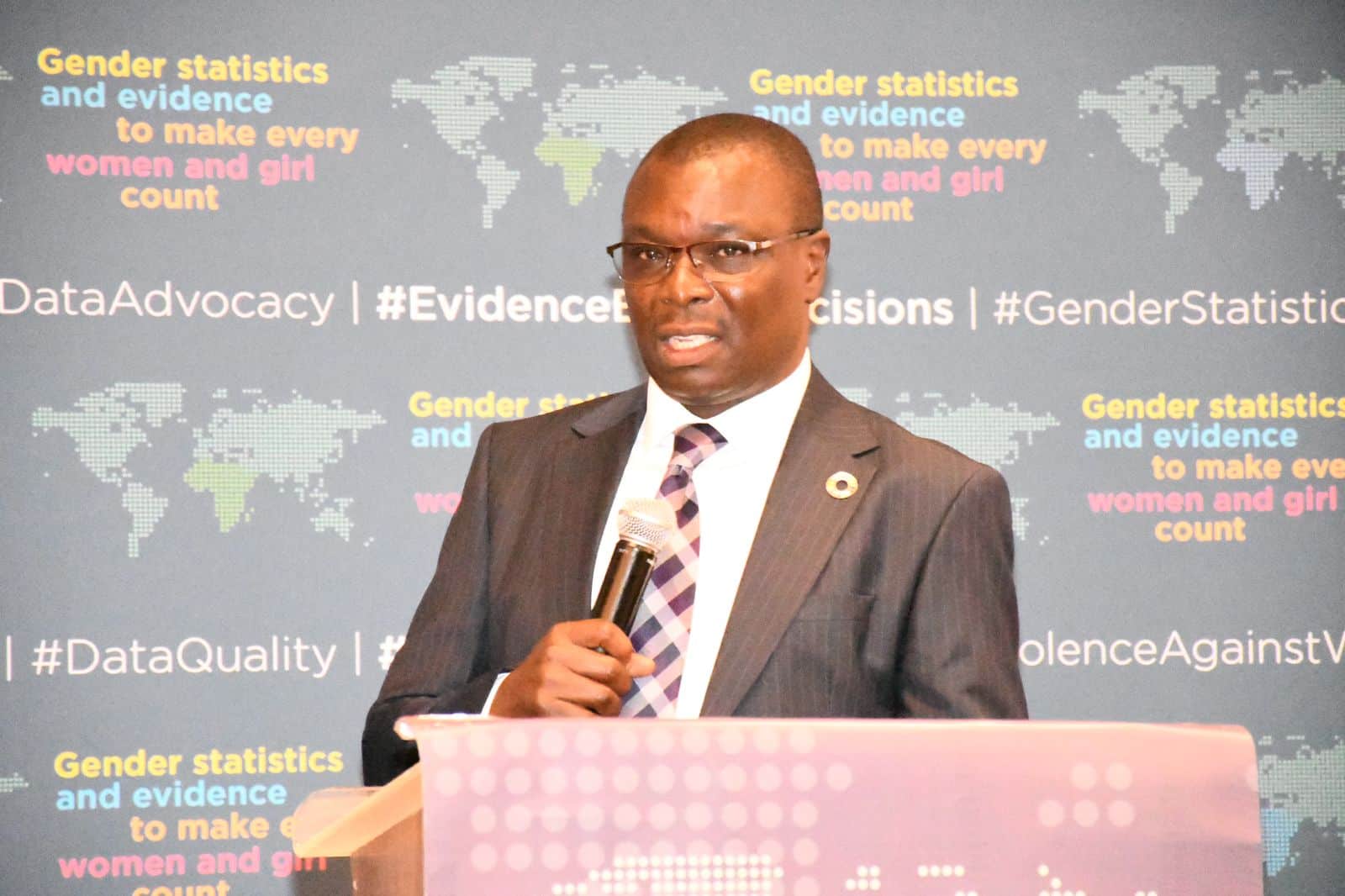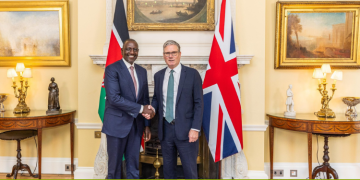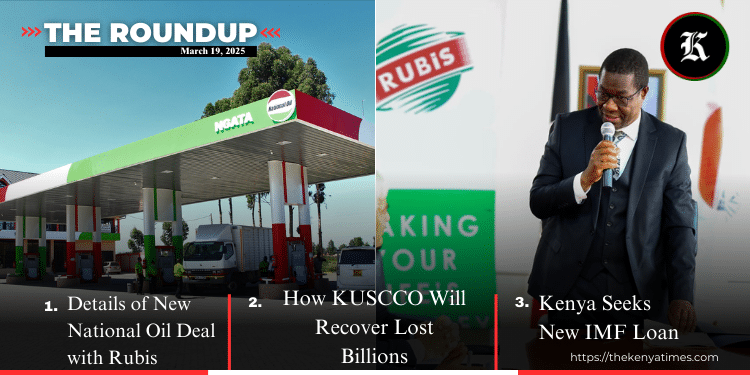Hello and welcome to today’s edition of The Business Roundup, where we bring you the latest updates on Kenya’s dynamic business landscape. In this edition, we dive into the National Oil deal with French firm Rubis Energy and explore the key economic trends shaping the nation’s financial future.
Government-owned National Oil Corporation of Kenya Ltd (NOC) entered into a strategic partnership deal with Rubis Energy Kenya.
NOC announced Rubis Energy Kenya as its non-equity strategic partner in a move aimed at enhancing Kenya’s oil and gas sector.
The non-equity strategic partnership is part of a broader restructuring plan designed to revitalize the state-owned entity and prevent its collapse.
The partnership comes as NOC faces severe financial challenges, with debts amounting to Ksh8.3 billion and a negative balance sheet.
Subscribe today and stay updated on top news stories in The Kenya Times Business Roundup. The Roundup presents a compilation of business stories that hit headlines throughout the week.

Rubis Energy Kenya Acquires National Oil
The restructuring plan involves splitting NOC into three subsidiaries under a single holding company.
The government will retain control of strategic assets through two subsidiaries, while the downstream market entity, which includes fuel stations, will be managed by Rubis Energy.
This arrangement aims to make downstream operations profitable, with profits shared between the government and Rubis Energy Kenya.
Cabinet approved the conversion of the National Oil Corporation of Kenya (NOC) into a group holding company with three distinct subsidiaries.
These include NOC Upstream Limited, which will focus on exploration and upstream production activities.
NOC Trading Limited will specialize in holding strategic stocks of petroleum products for import and export, while NOC Downstream Limited will concentrate on the marketing and distribution of petroleum products.
KUSCCO Moves to Recover Ksh 8.8 B Invested by SACCOs
And the troubled Kenya Union of Savings & Credit Co-operatives Ltd (KUSCCO) is considering several measures to raise funds for refunding affected member savings and credit cooperative societies (SACCOS).
Among the options, KUSCCO is contemplating selling a majority stake in its insurance subsidiary, KUSCCO Mutual Assurance, to strategic investors.
This comes after the firm suffered a Ksh13.3 billion heist under the watch of former officials.
In addition, KUSCCO is beginning the process of auctioning houses and land owned by loan defaulters under the KUSCCO Housing Cooperative (KHC), a move aimed at recovering lost funds.
The new management has also proposed selling off its loan book to willing financial institutions, with the goal of recovering at least Ksh8.8 billion within five years.
The target is to recover about 70% of the Ksh8.8 billion principal amount, or Ksh 6.2 billion, that SACCOS had invested in the umbrella body over the next three years.
KUSCCO Group Managing Director Arnold Munene explained that most of their assets, including loans to members, mortgages under the Kuscco Housing Fund, and assets from the Kitengela Homes project, are spread over a long repayment period, ranging from three to 15 years.
Additionally, the company plans to sell a 60% stake in KUSSCO Mutual Assurance once the new board takes office.
Govt Seeks New IMF Loan
In other news, Kenya has requested the International Monetary Fund (IMF) to drop the ninth review of its existing loan program—valued at over Ksh 460 billion—and instead seek a fresh arrangement.
The move signals a shift in the government’s approach to IMF engagement amid rising fiscal pressure and external debt obligations.
An IMF mission team, which met with President William Ruto and top economic officials, concluded discussions without disbursing the next tranche of Ksh103.6 billion under the current Extended Fund Facility and Extended Credit Facility programs.
While the IMF has acknowledged Kenya’s request for a new program, it remains unclear whether the government is seeking more flexible terms, a longer repayment period, or a broader reset of its fiscal commitments.
“The mission team engaged with the Kenyan authorities on recent developments and the macroeconomic outlook. The IMF has received a formal request for a new program from the Kenyan authorities and will engage with them going forward,” the IMF said in a statement.
“The Kenyan authorities and IMF staff have reached an understanding that the ninth review under the current Extended Fund Facility and Extended Credit Facility programs will not proceed.”

- The National Social Security Fund (NSSF) Kenya reported a significant increase in its fund value, which reached Ksh400.1 billion in 2024, up from Ksh 312.1 billion in 2023.
This marks a substantial rise, nearly tripling over the past decade from Ksh 134.9 billion in 2013. The growth has been attributed to higher contributions from members and strategic investments, reinforcing the fund’s financial stability and sustainability.
NSSF reported a paper gain of Ksh2.98 billion on its assets in the year to June 2024, compared to a loss of Ksh18.44 billion the previous year following a jump in the value of equities and bonds portfolio.
- Old Mutual Holdings, Kenya recorded an 84.7 per cent increase in its full-year profit before tax for 2024 from Ksh1.401 billion to Ksh2.587 billion.
- The uptake of Starlink satellite internet services in Kenya slowed for the three months ending December 2024, compared to the preceding quarter. This comes months after the company successfully doubled its market share in the country.
- The Kenya National Chamber of Commerce and Industry (KNCCI) is eyeing a $300 million (Ksh 37.8 billion) market opportunity for agro-processed products, a 45% potential export growth for pharmaceuticals, and the expansion of financial technology (fintech) in West African market through.
- Kenyan companies Collective Energy Africa, and Takaungu Regeneration Project Limited are seeking licenses for independent power generation and supply from the Energy and Petroleum Regulatory Authority (EPRA).
Kenya Shilling
The Kenyan shilling remained stable on Wednesday March 18, holding steady at 129.20/45, the same level as Tuesday’s close.
Traders are optimistic about potential gains in the coming days, driven by expected inflows from the Kenyan diaspora, according to reports from Reuters.
The Tanzanian shilling has weakened by 8.9% this year, making it the worst-performing currency globally, with rising imports & growing government debt adding pressure as reported by Bloomberg.
Tanzania’s rising imports and public debt are largely driven by infrastructure investments, which are supporting the country’s projected 6% GDP growth this year. However, these economic pressures may lead to further declines in the Tanzanian shilling before it begins to recover.
Follow our WhatsApp Channel and join our WhatsApp Group for real-time news update.











































































